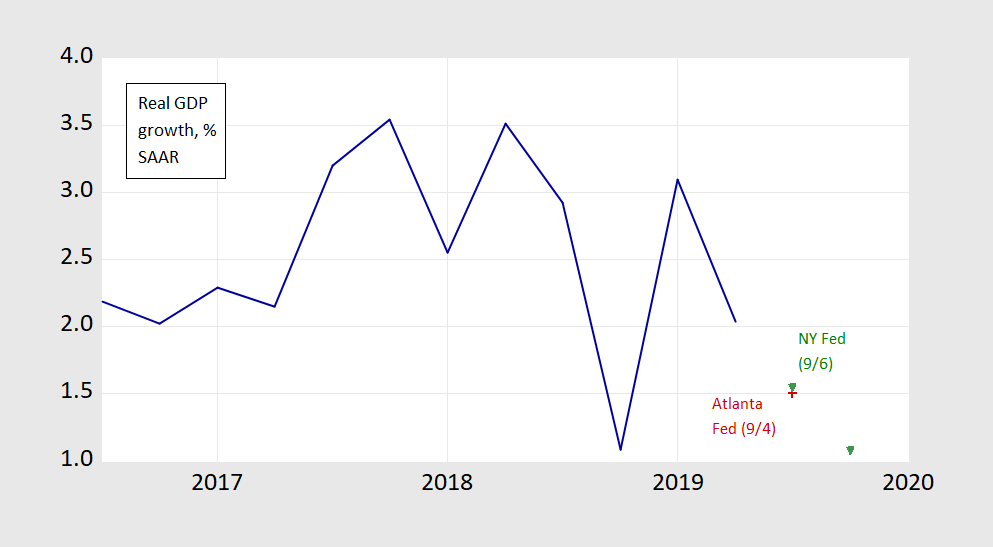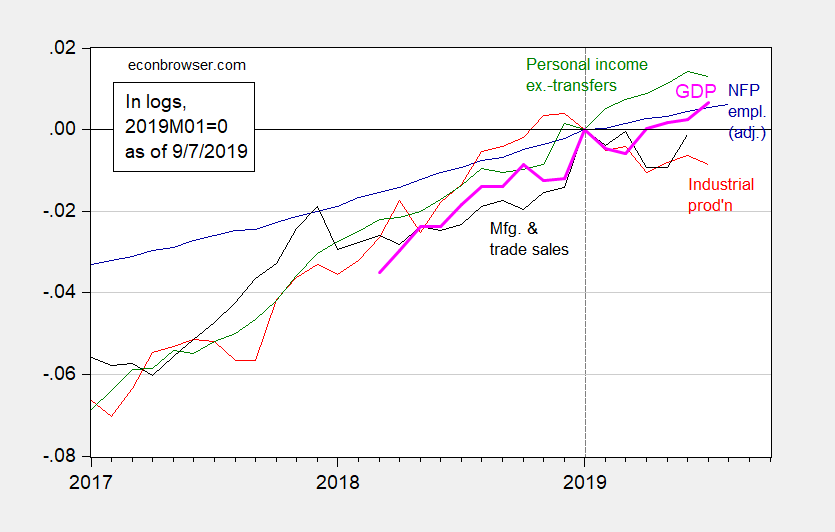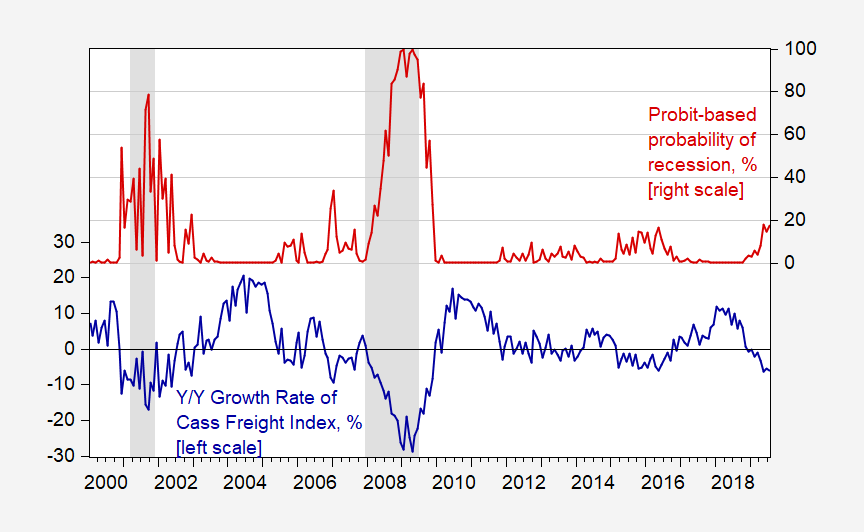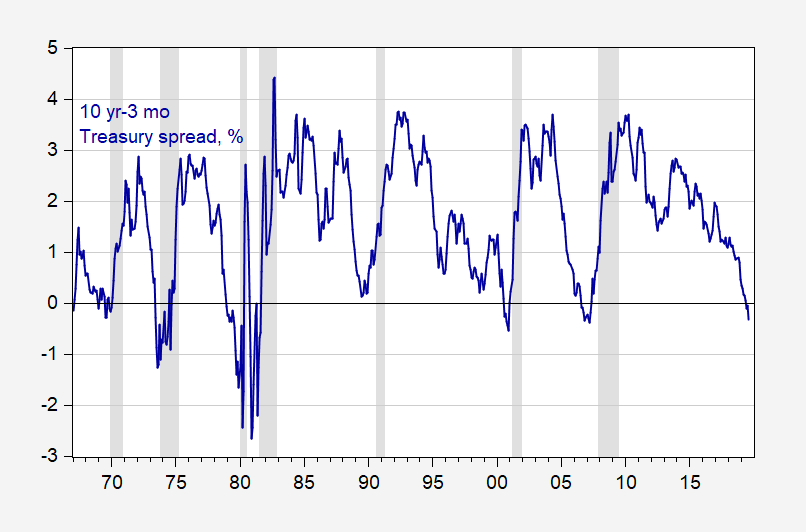In anticipation of Jim Hamilton‘s talk this Wednesday, I’m going to talk a little about recessions in today’s lecture. Here are some data to keep in mind:
Growth appears to be decelerating, including nowcasts:
But the most recently released data for some key variables do not yet signal a recession:
Except for some transportation indicators, like the number of freight shipments.
In the graph above, I also show a probability of being in a recession given freight traffic (using a probit model).
Forward looking indicators that have historically predicted a recession have been flashing red for months. The question is whether “this time is different”.
Just to be clear, a recession is not a 2 consecutive quarter decline in real GDP; that is a rule of thumb. Here is the NBER’s definition:
A recession is a period of falling economic activity spread across the economy, lasting more than a few months, normally visible in real GDP, real income, employment, industrial production, and wholesale-retail sales. The trough marks the end of the declining phase and the start of the rising phase of the business cycle. Economic activity is typically below normal in the early stages of an expansion, and it sometimes remains so well into the expansion.




Is 435 ab honours subject. I ask this because it would be down under
Not Trampis: At UW, it’s an upper division undergrad econ course. Prereqs incl. intermediate macro, money & banking; preferred that students have econometrics. (As far as I can tell, there is not clear standard in course numbering across universities in America, although they may be standardized across campuses of systems, e.g., University of California system).
Thanks mate or should I say Chinny
In his German post-grad classes they always affectionately called him “The ChinnyMeister”.
Er something. That’s what I heard. What am I a journalist er something??
I got my grimy, sticky, large paws (well, larger than donald trump’s anyway. Huh?? You don’t believe my handzies are twice the size of trump’s?!?!?! Whudeyuh want, an mp4 of my handzies??) on a book called “Climate Shock” co-wrtten by a guy who left us for whatsoever reasons he left us. In my usual lazy and lethargic way I have only got through the short preface, but thought it would be fun to share with our ragtag gang here 2-3 of my favorite sentences so far:
“Your love for your children may go beyond anything in this world, but as economists we are obligated to say that, strictly speaking, it’s not infinite”
“We don’t venture predictions only to see them become true. We talk about where unfettered economic forces may lead in order to guide them in a more productive, better direction.”
This is an approach for evaluating “financial crises”: https://qz.com/1696273/nyus-robert-engle-uses-his-srisk-model-to-predict-financial-crises/ . I’m not sure how they define “crisis” versus “recession”.
“Our approach is motivated by the observation that excessive credit growth, a main cause of financial crises, is reflected in the undercapitalization of the financial sector,” the professors wrote in their study (pdf), published yesterday (Aug. 27) in Proceedings of the National Academy of Sciences (PNAS). “Market-based indicators of systemic risk enable monitoring how such weakness emerges and progresses in real time.”
@ Brucerino baby
My “take” is recession is more tied to economic growth, or maybe the rate of economic efficiency. Crisis is something more “cooked up” out of playing funny business with accounting rules and finance regulations. 2008 came on like a ton of bricks mostly because of credit derivatives created by banks which effected equity markets exceedingly quickly, not because of mortgage loans given to minorities, unlike the walking piece of crap Peter J. Wallison would have the white-trash MAGA believe.
A recession could “unveil” or “accelerate” the timing of a “crisis” and a “crisis” could bring on a recession. In the end it’s a lot of word games and semantics (which rationalizes a lot of research papers that are redundant of each other and I’m sure some self appointed rocket scientist will tear apart what I wrote above, but it’s largely true anyway you wanna slice it.
“2008 came on like a ton of bricks mostly because of credit derivatives created by banks which effected equity markets exceedingly quickly, not because of mortgage loans given to minorities, unlike the walking piece of crap Peter J. Wallison would have the white-trash MAGA believe.”
be carefu mosesl. resident troll peak loser will throw a fit if you blame anybody other than democrats and poor home buyers for the financial crisis. apparently it was those folks who placed the gun to the head of bankers and financial types, forcing them into the stoooopid financial positions that resulted in their doom. those banker types like peak loser live in a fantasy world where they had no fault in the crisis. always somebody else fault.
I have a piece of news that I have this strange and omnipresent feeling, will come as no shock to a Professor Menzie Chinn:
https://www.nbcwashington.com/news/national-international/FEMA-Officials-Puerto-Rico-Fraud-Bribery-Charges-FBI-559940761.html
There’s also an NYT story on this, but I chose this link so people wouldn’t have a paywall to detour around.
Some other news people might find “interesting”, but maybe not that shocking:
https://www.politico.com/story/2019/09/10/trump-ousts-john-bolton-as-national-security-adviser-1488093
https://www.washingtonpost.com/news/morning-mix/wp/2018/09/12/document-shows-the-trump-administration-diverted-nearly-10-million-from-fema-to-ice-detention-program/?noredirect=on
I hope this doesn’t make Nancy Pelosi sad because she did everything short of giving donald trump an open check book to abuse children in ICE/MAGA cages and tents and she’s gonna need extra NyQuil tonight if she finds out everything there isn’t going according to plan. Pelosi’s going to get right on this as soon as she figures out which shelf in the refrigerator she left her car keys.
Saw Susan Rice on CNN talking about the Bolton fiasco and then just prior, the Taliban to Camp David fiasco. People want to smear Tulsi Gabbard for the Assad visit while she’s on the House Committee on Armed Services in Congress, and this bastard president is a half-second away from inviting the Taliban to Camp David and our conservative Republican snowflakes like David Brooks become deaf mutes. Is no one in this country even HALF literate?!?!?!
“Just to be clear, a recession is not a 2 consecutive quarter decline in real GDP; that is a rule of thumb. ”
Wrong.
Erik Poole: Ooh. Please tell me what *is* a recession, in the US.
Lecture slides, video?
You know, you can broadcast these events on Facebook or Instagram with really nothing more than an iPhone or iPad. Ask your youngest students. They’ll know how. It doesn’t have to be spectacular quality. Those of us interested in the presentation will make our way through.
Steven Kopits: Using the ipad/iphone to livefeed via Facebook yields too low quality broadcast; I am quoting here from staff. A video will be put up w/in a week or so.
trillion dollar deficits are back under trump
https://www.cnbc.com/2019/09/12/budget-deficit-smashes-1-trillion-mark-the-highest-in-seven-years.html
i thought we were in the best economy ever, according to comrade trump. if that were the case, i would have expected deficits to be dropping and not rising. perhaps i simply do not understand what best economy ever implies. would an increasing deficit be a leading or lagging indicator of recession?
Erik Poole: Ooh. Please tell me what *is* a recession, in the US.
Ooh. Menzie Chinn. Dance around a little more and you will clearly signal presidential material potential. The tone of the …. discussions here on this blog already suggests that you are serious Presidential material.
I would have thought that re-reading your statement, the problem would become obvious.
Menzie Chinn/b> wrote: “Just to be clear, a recession is not a 2 consecutive quarter decline in real GDP; that is a rule of thumb. ”
As a man of great stature and as an American, you can tell your students whatever you want to tell them.
Erik Poole: NBER coined the idea of “recession”, so I would think that it would be the relevant arbiter of what constitutes a recession. And the NBER quite clearly states that 2 quarters negative GDP growth is neither necessary nor sufficient condition for defining a recession. Read:
Erik Poole Maybe I’m especially dense, but I don’t understand what you’re getting at. It’s common knowledge that NBER does not define a recession as two consecutive quarters of negative growth, although oftentimes that experience coincides with NBER’s definition. The definition used in Europe comes close to saying two consecutive quarters, but even there the ultimate determination is made by a committee. The two consecutive quarters thing is just a rule of thumb:
“a significant decline in the level of economic activity, spread across the economy of the euro area, usually visible in two or more consecutive quarters of negative growth in GDP, employment and other measures of aggregate economic activity for the euro area as a whole.”
https://cepr.org/content/business-cycle-dating-committee-methodology?_ga=2.21389311.53506075.1568337259-1128016379.1568337259
Now it is true that Menzie has used the two consecutive quarters rule of thumb when posting about recessions at the state level, but I don’t think recessions at the state level have quite the same ontological status as recessions at the national or continental level.
Well, recessions certainly predate 1920. Regardless of the theoretical concepts and jargon deployed or lack of sufficiently rigorous measurement criteria, I tend to believe that ‘recessions’ were a bit of a topic before the NBER. In fact a whole theoretical apparatus was created to minimize the economic fluctuations that characterize freemarket economies. No doubt, the NBER did pathbreaking work in creating and setting up national accounts.
The complex, multi-criteria NBER definition of a recession appears to be the ‘official’ empirical definition of a recession in the USA. It enjoys solid, widespread professional and popular support.
Are the results that different? Is the measure cost effective? Do the number of economists employed compensate any possible short-comings?
Other countries to tend to use the simple measure: two-consecutive quarters of negative GDP growth. You may minimize its importance as a “rule of thumb”, if you wish. You may also use the expression ‘rule of thumb’ in a rather creative fashion if you wish. A number of rich western countries use the simple measure. Never looked but would be very disappointed if poor developing nations use the NBER measure.
When did simplicity become a negative in American economic circles? Is that why the employment mandate of the Fed is still firmly in place? After all economists are uniquely positioned to exploit rent seeking opportunities. The USA is certainly incredibly rich yet prone to recessions, some rather nasty. Neo-Marxists in the Baran-Sweezy tradition can readily explain these kinds of policies.
Incidentally, anybody know how many countries have adopted the NBER method of determining/estimating the beginning and ending dates of recessions? Curious.
Erik Poole: Don’t know about you, but I’ve actually written a paper on cross-country evidence *on recessions*. I did a little investigation. I actually know several people on the NBER BCDC, and actually talk to them. In order to write the paper, I had to obtain a chronology for several advanced economies. And, there is no constant among governments on how to define a recession — because it would lead to perverse incentives. So…if you are interested, CEPR dates the euro area recessions, and private firm ECRI does so for several economies. In neither of these cases is a simple 2 consecutive quarter GDP rule used. OECD uses *a deviation from trend*.
By the way, as somebody who has some familiarity with the process of recession/expansion dating, I can tell you that you need not worry about the consumption of tremendous man-hours devoted to determining a recession; it’s done by … the NBER business cycle dating committee, a whole 8 people at time of last announcement.
And yeah, using the two consecutive quarter criterion, the 2001 recession would not be a recession.
Eric,
Sorry, but you are simply dead wrong here. The concept of “recession” was coined to describe the GDP decline that occurred in 1937. Before that the word “depression” was used for all of them. But it is important to realize that as one goes further back in time, the data becomes much fuzzier, and there were no estimates of GDP being made at all, with those we have now for those times imposed by modern modelers looking at what data was available. Heck, GDP was not even invented as a concept. We did not get all that until well into the 20th century with Simon Kuznets.
I’ve always been fond of the British term “slump” to describe an economic contraction. It has a kind of Monty Pythonish ring to it.
Well clearlyMenzie Chinn, you a are an American man of great stature. You can define and redefine things as you wish. Even take a crack at revising history, everybody else does. You can use the English language as you wish. You can be the high priest of transparency or not.
Speaking of perverse incentives…… You could not worry and rely on passive fiscal policy or you could make you sure you define the recession beginning and ending correctly (sic) so those pushing hard for active, discretionary fiscal policy many months after the fact will have the correct rhetorical ammunition.
You could encourage policy makers to target per capita wealth or continue to encourage policy makers to target ‘growth’. If the 2001 recession had not been called, maybe the only folks who would have cared would have been other American economists.
In passing, aspects of this exchange remind me of the optimal level of debt notion.
As a hard-working, accomplished empirical economist, when you do come up with the estimates of the billions or trillions of dollars of wealth that has been ‘saved’ over the decades thanks to the NBER recession dating method, please share.
Erik Poole: These are not my definitions. They are definitions in common usage, dare I say it, in textbooks as well. Now, I *could* define a tomato as a vegetable. That might seem reasonable, that might be common usage. But there is an established definition of tomato as a fruit, by scientists. They got there first, they have a methodology, seems like they should have first claim. But if *you* want to define tomato as a vegetable, by all means.
I have to say, the NBER itself makes no claim to judging recession dates in real time; rather it’s trying to set a historical chronology, usually *long after the fact*. How can “billions or trillions” of dollars of wealth be affected?
menzie, you will find both the ignorant on this blog, as well as the ideologically bent folks, like to redefine technically accepted definitions into their own warped viewpoint to try and win an argument. we have folks who try to redefine rational markets, recessions, etc away from their technical definitions to “common sense” definitions, in a sense trying to hijack well known terms to reinforce falsehoods. pundits do this all the time on tv, because unless you are an expert in the field, you won’t be able to catch and correct the trick in real time. this happens to journalists all the time on tv. which is why i appreciate when you call out folks on this blog for doing the same. it may seem like a waste of time, but this fight against disinformation is necessary for a civil society to survive.
Barkley: Thank you for the polite response. That can be rare on this forum.
What was I wrong about exactly? Please spell it out.
Now Menzie Chinn described 2-consecutive quarters of negative GDP growth as a ‘rule of thumb’. Would you like to back up that assertion please. Perhaps you could stick to the received definition of ‘rule of thumb’ as opposed to making up a new one, please?
-Erik
“Now Menzie Chinn described 2-consecutive quarters of negative GDP growth as a ‘rule of thumb’. Would you like to back up that assertion please. Perhaps you could stick to the received definition of ‘rule of thumb’ as opposed to making up a new one, please?”
Pardon my bluntness Erik, but you really come off as an idiot. Maybe instead of saying “wrong” with no explanation or referring to a “received” definition (whatever that is), you could explain yourself.
Dave: I want to thank you and baffling for the personal insults. It fits well with the Menzie Chinn’s Making American Economics Great Again blog style. I particularly enjoyed baffling’s strong, compelling ‘authority argument’.
You are correct to the extent that one should not normally lead with “Wrong”. But these are different times. Maybe I was trying reach American economists in a style that they would recognize. Think of it as being ‘culturally respectful’. File it under an attempt to “Talk to Americans”. In a language that is familiar and comfortable.
Erik Poole: If you were aiming for clarity, you have (utterly) missed.
erik poole, that was not a personal attack, nor an “authority argument”. most technical fields have defined terms specifically to avoid miscommunication among participants. most technically literate folks in those fields work with those definitions as the accepted (and gentlemanly) way of carrying on discourse. when you can arbitrarily change the definition of important keywords, the discourse quickly becomes meaningless. that seems to be your goal at the moment. in some sense, you are participating in gaslighting by claiming the currently accepted practice is wrong. please stop doing that erik.
Erik,
My comment that you were coming off as an idiot is not per se a personal insult. It is not rare for very smart people to *appear* nonsensical. You seem to lack skills in basic reading comprehension and rhetoric. <– now that was personal, but fully empirically supported. You keep writing things that utterly fail to explain your argument (to the extent that there is one). Now you are throwing out pejoratives about "Americans" and "American economists." Just remember, you are the one who began this whole thing with your wholly inappropriate, and wholly incorrect, statement "wrong."
Now, you have revamped your argument to be that the following statement, which nobody ever used before you in this blog, is just incorrect arrogance: "Just to be clear, the USA uses the correct definition of a recession and other countries’ statistical agencies use the incorrect definition of a recession."
However, again, you are the one who is wrong here. First, this entire post has been about the U.S. economy. And, see, NBER definition. Second, while it is true that the "rule of thumb" statement is not explicitly limited to refer to U.S. only, it is still entirely correct. That is, you are still wrong. Moreover, you have utterly failed to provide a single source or cite to support your argument. Menzie has provided several in support of his point.
Finally, your particular choice of hill to die on is very very silly. I suspect you are just a troll. Perhaps you regularly comment under another pseudonym?
To recall, Menzie Chinn wrote: Just to be clear, a recession is not a 2 consecutive quarter decline in real GDP; that is a rule of thumb.
That is incorrect, it is wrong. But let’s rewrite that phrase for the benefit of American economists.
Just to be clear, the USA uses the correct definition of a recession and other countries’ statistical agencies use the incorrect definition of a recession.
The implicit arrogance certainly plays to stereotypes outside of the USA.
Erik Poole: Even your rewording is incorrect. Other countries’ statistical agencies do not use an incorrect definition. They don’t typically have a definition, for good reason. It would be politically delicate to have to declare a recession.
Regarding the BCDC methodology, see Berge and Jorda (2011).